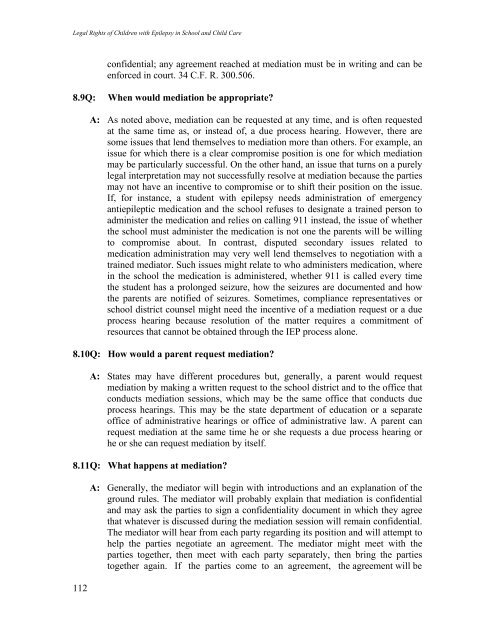Legal Rights of Children with Epilepsy in School & Child Care
Legal Rights of Children with Epilepsy in School & Child Care
Legal Rights of Children with Epilepsy in School & Child Care
You also want an ePaper? Increase the reach of your titles
YUMPU automatically turns print PDFs into web optimized ePapers that Google loves.
<strong>Legal</strong> <strong>Rights</strong> <strong>of</strong> <strong><strong>Child</strong>ren</strong> <strong>with</strong> <strong>Epilepsy</strong> <strong>in</strong> <strong>School</strong> and <strong>Child</strong> <strong>Care</strong><br />
confidential; any agreement reached at mediation must be <strong>in</strong> writ<strong>in</strong>g and can be<br />
enforced <strong>in</strong> court. 34 C.F. R. 300.506.<br />
8.9Q:<br />
When would mediation be appropriate?<br />
A: As noted above, mediation can be requested at any time, and is <strong>of</strong>ten requested<br />
at the same time as, or <strong>in</strong>stead <strong>of</strong>, a due process hear<strong>in</strong>g. However, there are<br />
some issues that lend themselves to mediation more than others. For example, an<br />
issue for which there is a clear compromise position is one for which mediation<br />
may be particularly successful. On the other hand, an issue that turns on a purely<br />
legal <strong>in</strong>terpretation may not successfully resolve at mediation because the parties<br />
may not have an <strong>in</strong>centive to compromise or to shift their position on the issue.<br />
If, for <strong>in</strong>stance, a student <strong>with</strong> epilepsy needs adm<strong>in</strong>istration <strong>of</strong> emergency<br />
antiepileptic medication and the school refuses to designate a tra<strong>in</strong>ed person to<br />
adm<strong>in</strong>ister the medication and relies on call<strong>in</strong>g 911 <strong>in</strong>stead, the issue <strong>of</strong> whether<br />
the school must adm<strong>in</strong>ister the medication is not one the parents will be will<strong>in</strong>g<br />
to compromise about. In contrast, disputed secondary issues related to<br />
medication adm<strong>in</strong>istration may very well lend themselves to negotiation <strong>with</strong> a<br />
tra<strong>in</strong>ed mediator. Such issues might relate to who adm<strong>in</strong>isters medication, where<br />
<strong>in</strong> the school the medication is adm<strong>in</strong>istered, whether 911 is called every time<br />
the student has a prolonged seizure, how the seizures are documented and how<br />
the parents are notified <strong>of</strong> seizures. Sometimes, compliance representatives or<br />
school district counsel might need the <strong>in</strong>centive <strong>of</strong> a mediation request or a due<br />
process hear<strong>in</strong>g because resolution <strong>of</strong> the matter requires a commitment <strong>of</strong><br />
resources that cannot be obta<strong>in</strong>ed through the IEP process alone.<br />
8.10Q: How would a parent request mediation?<br />
A: States may have different procedures but, generally, a parent would request<br />
mediation by mak<strong>in</strong>g a written request to the school district and to the <strong>of</strong>fice that<br />
conducts mediation sessions, which may be the same <strong>of</strong>fice that conducts due<br />
process hear<strong>in</strong>gs. This may be the state department <strong>of</strong> education or a separate<br />
<strong>of</strong>fice <strong>of</strong> adm<strong>in</strong>istrative hear<strong>in</strong>gs or <strong>of</strong>fice <strong>of</strong> adm<strong>in</strong>istrative law. A parent can<br />
request mediation at the same time he or she requests a due process hear<strong>in</strong>g or<br />
he or she can request mediation by itself.<br />
8.11Q: What happens at mediation?<br />
112<br />
A: Generally, the mediator will beg<strong>in</strong> <strong>with</strong> <strong>in</strong>troductions and an explanation <strong>of</strong> the<br />
ground rules. The mediator will probably expla<strong>in</strong> that mediation is confidential<br />
and may ask the parties to sign a confidentiality document <strong>in</strong> which they agree<br />
that whatever is discussed dur<strong>in</strong>g the mediation session will rema<strong>in</strong> confidential.<br />
The mediator will hear from each party regard<strong>in</strong>g its position and will attempt to<br />
help the parties negotiate an agreement. The mediator might meet <strong>with</strong> the<br />
parties together, then meet <strong>with</strong> each party separately, then br<strong>in</strong>g the parties<br />
together aga<strong>in</strong>. If the parties come to an agreement, the agreement will be








